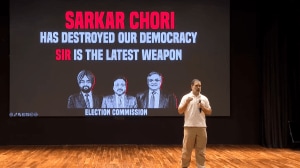At the summit, down to earth
So what’s the agenda for the SAARC summit? Will Atal Bihari Vajpayee be meeting Mir Zafarullah Khan Jamali and Pervez Musharraf on the ...

So what’s the agenda for the SAARC summit? Will Atal Bihari Vajpayee be meeting Mir Zafarullah Khan Jamali and Pervez Musharraf on the sidelines? Will bilateral issues be discussed? Then, will the Pakistanis give up infiltration, terrorism, their obsession with Kashmir, give up their fundamental hostility towards India?
Interesting, that so much of the discussion leading up to this summit has been dominated by these questions and yet nobody is raising the one question that matters and the shadow of which is large, and ominous enough to cover, in the long run, all those being raised in the immediate. What is the future of Pakistan? Where is it headed, under Musharraf, in the near future, and in the long run? Can it modernise, stabilise itself and join the global mainstream in the foreseeable future? If it does, terrorism, Kashmir, the visceral, fundamental hatreds and insecurities will matter less and less as time passes. If it does not — or cannot — no summits or declarations, multilateral or bilateral, would count for very much and sooner rather than later somebody will do something to bring you back to square one, which, in our context, is eyeball-to-eyeball on the LoC.
It is possible that the prime minister understands that. Is that why he has been talking about age not being on his side and this being his last attempt at peace-making? Is he conscious, too, that irrespective of what process he sets into motion its logical conclusion will only be seen much later and, what it is would be determined more by the Pakistanis, their leadership and elites than by any outsiders, including India? There are uncertainties in dealing with Pakistan at the best of times. At around the same time in 1989 I was among those gullible optimists taken in by the euphoria of the Rajiv-Benazir chemistry at the then SAARC summit. Benazir paid for it soon enough with her job. I was among those equally gullible once again at Lahore in 1999, this time watching the Vajpayee-Nawaz Sharif bear hug. We paid for that at Kargil, and Nawaz Sharif, ultimately with his job. These are not even the best of times.
Maybe a better way to approach the issue is to depersonalise the problem first. Forget, for a moment, the Musharraf problem. Or even Kashmir or terrorism. Think of what Pakistan could grow into 20 years hence. It could be a nation of 25 crore people, way behind its bigger neighbours (China, India, Iran) in terms of per capita incomes and literacy, with just one river-water system to support its economy, out of the global economic system, angry, hateful of India and probably the West but still retaining a sizeable and modern army with nuclear weapons. Now, how would that Pakistan deal with any agreements signed now or later with even a most well-meaning and sincere Musharraf? Similarly, if Pakistan were to choose the path of modernity, embrace the global economic and political system, modernise its polity and build real institutions of democracy and governance, many of the problems for which we search solutions today would seem irrelevant.
In India, it is tempting for us to jump to conclusions as to which of these directions Pakistan is headed in. But it is dangerous to allow your prejudice and anger to cloud your judgment. We believe the Pakistanis do not have the institutions, intellect or even the intention to reform and modernise and therefore have no future. But then, as Vajpayee says repeatedly, can we change our neighbours? If you raise this issue with senior American officials and analysts, for example, they agree with much of our prognosis but then ask a counter-question: if that is the way Pakistan seems headed, shouldn’t you, and the rest of us, be worried? And if so, shouldn’t we be doing something about it?
Many senior American officials, visiting the region in the course of their “friendly” or “facilitational” role, have over the past couple of years expressed exasperation at the level of discussions in which they are engaged on both sides of the border. Both sides, they complain, seem more concerned about the immediate, on how many infiltration attempts took place on the LoC last week, or when will the Indians come to the negotiating table. But the Indian side has gradually begun to focus on the big issue. That is why this Vajpayee initiative and his persisting with it despite so many provocations and pressures. Unless you engage with Pakistan, you can play no role in the direction it takes in decades to come. And if you are no-show in that game, you could only be heading for the apocalypse, now or later.
We sometimes get so overwhelmed by the troubles in Kashmir and the spillover elsewhere as to miss the big picture. And the big picture is that the global war on terror will ultimately be fought in Pakistan. Iraq will settle one way or the other, and in any case, Iraqi nationalism is very much its own. The Palestinian terrorism is confined very much to that little piece of real estate. But if you look closely, Pakistan is the only full-fledged state in the world where genuine pan-national terrorism exists. Osama and Al-Qaeda are somewhere thereabouts. So are Jaish and the many Lashkars. Even the people of Pakistan, particularly the elites, know that they are as much a threat to them as to anybody elsewhere. And if Musharraf had any doubts about this, the two attempts on his life should have set them at rest.
So what should Vajpayee be telling Musharraf when they meet — and meet they will — in Islamabad? Instead of one more seminar on the history of the Kashmir problem, he should be telling him a few stories of the recent state election campaign. Of how governance, not Hindutva or terrorism, were the main issue, of how people, once they begin to see a stake in a better future, are perfectly capable of letting their zest for a better life subsume old fears and hatreds. And of how this has given him the moral and the political strength to think in terms of an earlier election. The larger message is that while the top leaders address issues that have defied solution for decades, nothing would strengthen them more than democracy, stability, modernisation and people who are willing to look forward to a better future rather than fret over the past. What is needed, therefore, instead of another inconclusive Indo-Pak seminar on the Kashmir issue, is a tutorial on where the two societies should be headed.
Given his seniority in age, statecraft, and his growing international image of statesmanship, Vajpayee could indeed raise the level of the exchange thus while at the same time preventing this again from lapsing into the same old story of claims and counter-claims not so much on whether Kashmir may be resolved as on whether that issue was discussed at all. The coming Indian election promises to mark a real break from politics of the recent past. National security, terrorism, mandir, conversions, Kashmir, are not going to be the issues dominating the campaign this time. It could, in fact, turn out to be our most governance-oriented election battle in nearly a quarter century, after Mrs Gandhi’s 1980 “government-that-works” campaign in the summer of 1980. The one person who could change that script, however, is Musharraf. All he has to do is, junk the ceasefire, let nonsense resume in the Valley and return to the Kashmir-as-core-issue pulpit. It would buy him peace, even personal safety, in the short run. But what will it do for his nation’s and his personal future is what Vajpayee needs to underline for him. Vajpayee may not have age on his side. But he has enormous wisdom, patience, and the promise of another five-year term. He has to make the general understand the significance and value of that and in a gentle, convincing manner that is so much his trademark.
Write to sgexpressindia.com



- 01
- 02
- 03
- 04
- 05




























